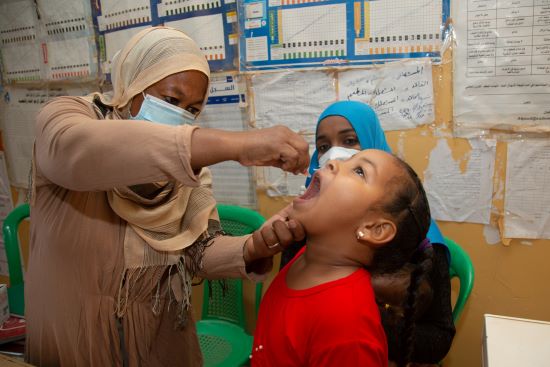28 December 2022 – Like any other infectious or communicable diseases, polioviruses do not recognize international borders. They do, however, recognize and spread effortlessly among young children with low immunity.
To prevent any spread of polioviruses in their region, from 21-22 December 2022, Sudan’s Federal Ministry of Health hosted neighbouring Chad and South Sudan for a 2-day meeting in the country’s capital, Khartoum. The WHO country office in Sudan organized the meeting, with support from the WHO offices in Chad and South Sudan, and brought together polio and immunization experts from the ministries of health and WHO offices of each country.

The meeting was conducted on the heels of the confirmation of a new poliovirus outbreak of circulating variant type 2 virus (cVDPV2) on 16 December 2022 in Sudan. This event comes after the country closed an outbreak from a different cVPDV2 emergence in August 2022.
Sudan has already begun to mount a speedy response to the new outbreak, with support from WHO and partners. By bringing together neighbouring countries that have strong cultural ties with Sudan, and that witness frequent population movement across shared borders, Sudan’s Federal Ministry of Health is taking concrete measures to prevent any further spread of polioviruses.
Common plan designed to facilitate regular collaboration
At the meeting, participants discussed the progress and challenges in polio epidemiology, programme management and population movement across the borders in their countries. They also crafted a common plan to scale up AFP surveillance and immunity across the border areas of these countries. This plan will improve countries’ coordinated response to ongoing and future polio outbreaks.
So far in 2022, Chad has confirmed more than 22 cases of cVDPV2, while Egypt has had multiple positive environmental samples reported in the country in the last 2 years, including detections genetically linked to Chad and Sudan. Ethiopia reported 1 case of cVDPV2 in 2022, and South Sudan reported 9 cVDPV2 cases in 2021.
Recommendations made to boost immunization
At the end of the meeting, the 3 countries agreed to jointly strengthen the sharing of information, including on vaccination, at local levels. They also agreed to continue regular cross-border meetings every 6 months, identify and fill in existing gaps, and coordinate with additional partners such as organizations working in hard-to-access locations, community leaders and civil society actors.
These collaborative efforts will support polio eradication teams in the 3 countries and beyond to monitor their progress, raise communities’ awareness on polio spread and prevention, encourage concurrent immunization activities to boost children’s immunity, and optimize resources where possible.
The technical experts also agreed to assess and develop their capacity to respond to polio outbreaks along shared borders, within and among the countries.
“People crossing over the porous borders in this region include nomads, migrants and displaced families fleeing their homes for better lives. These populations are difficult to monitor and usually vulnerable families in need of essential health services such as childhood immunization,” said Dr Nima Saeed Abid, WHO Representative to Sudan.
“Although this international cross-border meeting will ensure better AFP surveillance and that vulnerable children can access polio vaccines, we must ensure follow up of action points by all member countries for a better outcome of the meeting,” he added.
Most recent cross-border meeting
The most recent cross-border meeting of this kind was conducted in November 2018, when Chad, Egypt, Ethiopia, Libya, South Sudan and Sudan endorsed the Khartoum Declaration on Sudan and Bordering Countries. Through this declaration, the 6 countries worked to strengthen preparedness and response to public health events and threats, including polio outbreaks.
These efforts will support polio eradication teams in the 3 countries and beyond to coordinate their activities, maximize efficiency and monitor their progress on polio spread and prevention, and optimize resources where possible.
Such coordinated efforts help countries to implement the International Health Regulation (IHR 2005), enhance global health security and prevent disease spread.


